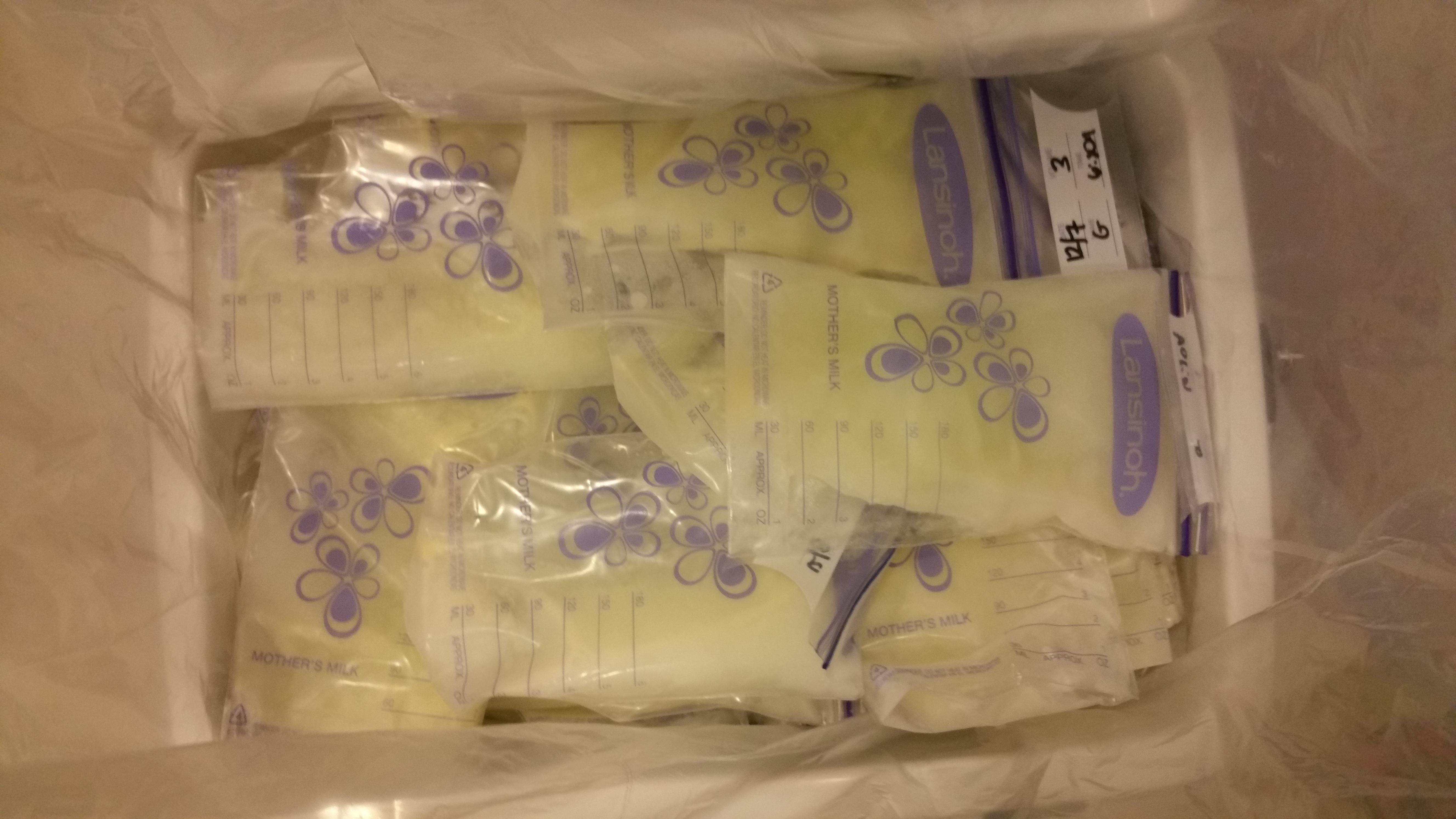Breastfeeding while training for an endurance event – is it possible?

In recent years, more women than ever before have taken to training for, and subsequently competing in, endurance events. While some women don’t discover the joy of running until later in life, many run through much, if not all, of their pregnancy and in the immediate postpartum periods. Despite this, there is a dearth of information out there related to breastfeeding while training for an endurance event like a half or full marathon. While I’m not a medical professional or a lactation consultant, I thought I’d at least describe my own experiences on the subject. It’s all anecdotal, but maybe it’ll help contribute something to the conversation.
I’ve heard breastfeeding described before as being one of the most “natural” things a woman can do but also one of the most complicated. At its core, as one pediatrician told my childbirth class, you only need two things: a baby and a boob. Simpler still, you can say that BF ultimately boils down to the old economic law of supply (the lactating mother) and demand (the hungry and growing child). Of course, there can be externalities that might affect a woman’s ability to BF her child (should she so choose), but in its most basic state, I believe that thinking of BF in terms of economics makes sense. The baby demands; you, the lactating mother, supply.
It can be a little tricky when you throw endurance training into the mix. Among other questions I’ve heard or encountered: how do you keep your supply up? How do you account for your child’s demand if you’re not always there to satiate him or her? Can training affect your supply? What about if you have a tough training session; does your milk become saturated with lactic acid (and therefore become unpalatable to your child)? Is it even comfortable to BF and train?
I breastfed my first for 18 months and have been breastfeeding my youngest for 10 months. With my first, I began running again at 6 weeks postpartum (after stopping at about 35 weeks pregnant) and didn’t run my first HM until about 5 months postpartum and my first marathon nearly 1 year postpartum. With my youngest, I ran for the entirety of my 38 week pregnancy and began running again at 3 weeks postpartum, with my first HM at about 3.5 months postpartum and my first marathon at about 7.5 months postpartum. Again: I’m by no means an expert, but I thought I’d at least throw some anecdotal experiences out on the internet because there’s just not a lot out there about BF and endurance training. I don’t know that it’s necessarily that there aren’t a lot of BF endurance athletes out there; I think we’re just not talking about it.
Maintaining supply
What seems to be one of the most important aspects related to BF and endurance training is nutrition. While BF, your body burns additional calories each day (perhaps even up to 500/day), and if you’re training for an endurance event like a marathon, you can easily work yourself into a caloric deficit if you’re not careful. Sure, it would be easy and effortless to replace the calories you’re torching from training and BF on nutritionally-horrible stuff like sweets, and while that’s okay (and human!) periodically, you’ve gotta remember to give both yourself and your child quality, nutrient-dense foods. I personally don’t restrict my caloric consumption or count calories, and especially not while I’m BF and training, so I try to just ensure that most of the foods I eat serve some nutritional (and delicious) purpose. Carbs, fats, protein, staying hydrated – all that stuff matters all the time and especially when you’re balancing BF and training.
I’ve heard/read of some women who say that if they try to restrict their calories while BF, their supply drops. You might find that your body holds on to a few final pregnancy pounds while BF – which apparently serves a biological function – but this might also vary from woman to woman. I’m down to the same weight/clothing size now as I was before I was pregnant, even with the BF and training mix, but I protect my milk supply like it’s gold. Honest to god, I probably eat and drink more than anyone else in my household combined on any given day. My never-ending appetite aside, what matters most here is that my baby is growing and thriving (she’s been 90th+ percentile from the get-go), and I’m consuming enough to be able to fuel my workouts and day-to-day life. Basically: an overwhelming majority of the time, eat stuff that you know is good for you. Eat enough for you, but also keep in mind your training volume and your growing child.
Anticipating demand
A staple of marathon training is, of course, the weekly long run (and sometimes even a weekly medium long run or two), so while the majority of your runs will be fairly short, there will be at least one run a week wherein you’ll find yourself separated from your BF child for possibly three or more hours. Before I leave for my LR, I’ll usually pump in the morning (if she’s asleep) and/or feed her before I leave. If my baby is still sleeping, then my husband will have milk readily available, should she wake up while I’m gone. Even if my baby sleeps the entire time I’m gone, pumping sends a message to my body that it needs to continue to produce that same amount of milk for my child (again, that economic principle of s&d); basically, my body made milk + I pumped it out (and/or fed it to my child) = my body hears the message that it needs to make more milk to compensate for what I just expelled.
Furthermore, you might find that you simply can’t run without pumping first, just because you need to slough off the extra weight and pressure. If I don’t pump before a morning run, I honestly think that engorgement would prevent me from even getting down the street. Engorged, milk-heavy boobs basically feel like small weights on your chest. Think of really “full” breast implants, and you’ll get an idea of where I’m going. The worst thing you can do is to let milk just pool in your boobs because your body interprets that as a decreasing demand signal, so if you’re going to be separated from your child for long, pumping might be in your best interest. The flip side of this, too, is to feed as soon as you arrive home from your run.

Can training affect supply?
So far, my experiences with BF both times make me think that my training hasn’t affected my supply – but that’s me. When my first child was little, I was training at a much lower volume (maybe 20-40 miles per week) than what I’m doing now (50-65 mpw). I think ultimately this ties into my earlier point about ensuring that you’re satisfying your caloric and hydration needs while simultaneously BF and training. In other words, if your supply is low, that might not necessarily mean that training is diminishing your milk; it might simply mean that you’re not supplying your body with sufficient energy (from the foods and beverages you’re consuming). If you suspect your supply is lessening, I would consider BF your child (and/or pump) more frequently, too – again, the laws of supply and demand.
Post-exercise milk
Remember when people used to think that women’s uteruses would fall out if they ran? Or what about when people were sure that the best thing a pregnant woman could do was to stay in bed for the duration of her pregnancy? Times have changed. Similarly, for a while, many people thought that if a lactating woman trained very hard, her body would produce copious amounts of lactic acid that would seep into her milk and thus produce rancid-tasting, inedible nutrition for her baby. Not so. Towel down post-run, and you’ll be good to go. Your milk will be fine. The nutrition remains.
Comfort measures
Finally, especially when you first begin BF, your breasts can be super uncomfortable and feel heavy or even hard as your milk is coming in. My experiences have been that the initial discomfort passes and that as your body and your baby “connect,” your supply will as well. Even now, if I am separated from my baby for many hours, milk pools and ultimately results in some discomfort and engorgement-like feelings, but it’s nothing like what it was in the very early weeks of BF. If you want to run/train while you’re BF, do what you need to do to make yourself comfortable and to (obviously) meet your child’s nutritional needs. Aside from feeding before or after runs, pumping before or after runs, or even hand-expressing milk in the shower (to instigate a let-down) before or after a run, you might find that investing in a good sports bra can make all the difference in the world or that even doubling-up on bras is the way to go. This is an experiment of one, so anticipate some trial-and-error before finding your groove.
More than anything, it’s important to give yourself some perspective. How you decide to feed your child is up to you; if it’s important to you to both BF and train for an endurance event, more power to you. Flexibility is critical during the postpartum stage for all the obvious reasons, and some days you might find that you have to cut a run short because you can feel your milk coming in and want to get back before you get too uncomfortable (been there, done that). Other days, you might not be able to get out at all because your child is going through a growth spurt and is feeding seemingly all the time, pretty much throwing your running window out the door (been there, done that, too). Give yourself permission to take things a day at a time and adjust accordingly. Your BF days will make up such a tiny percentage of your child’s life, whereas in comparison, you will probably be training for endurance events for far longer. It’s not impossible to BF and train for an endurance event, but with some planning on your part – and a superior support network at home – I bet you’ll do great.
Latest Articles
 Is Running on a Treadmill Easier Than Running Outside?Runners have their own preferences, whether it is treadmill running, running outside on the road, or exploring trails. So...
Is Running on a Treadmill Easier Than Running Outside?Runners have their own preferences, whether it is treadmill running, running outside on the road, or exploring trails. So... Is It OK to Use Trail Running Shoes on the Road?While trail running shoes can be used on roads, especially in situations where a runner encounters mixed terrains or pref...
Is It OK to Use Trail Running Shoes on the Road?While trail running shoes can be used on roads, especially in situations where a runner encounters mixed terrains or pref... How to Fix Sore Quads After Running?Rest, ice, gentle stretching, and over-the-counter pain relievers can help soothe sore quads after running. Also, ensure ...
How to Fix Sore Quads After Running?Rest, ice, gentle stretching, and over-the-counter pain relievers can help soothe sore quads after running. Also, ensure ... 10 Fruits With The Most Electrolytes to Replace Sports DrinksThese fruits are high in electrolytes such as potassium, magnesium, and calcium, essential for hydration, muscle function...
10 Fruits With The Most Electrolytes to Replace Sports DrinksThese fruits are high in electrolytes such as potassium, magnesium, and calcium, essential for hydration, muscle function...

